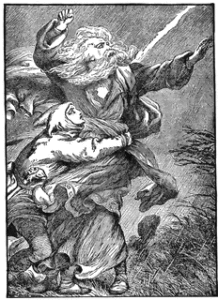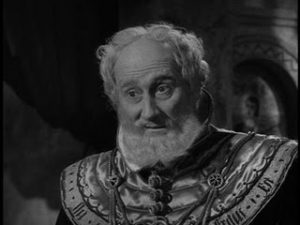Loyal readers know I’ve got a soft spot for The Tempest. I worry that I sound like a broken record saying that. So even though my book review queue is backed up well beyond my ability to ever get through it, I said sure, go ahead and send me Miranda and Caliban by Jacqueline Carey.
I wish I could say I liked it, but I just can’t. First of all, it’s written in that “I want to sound Elizabethan” manner of speech which ends up being more grating than anything else. The author’s got a particular fondness for the word “mayhap”, to the point where it would sometimes appear multiple times on a single page of dialogue. Does she think that sounds like Shakespeare? I checked – that word does not appear in Shakespeare.
The story itself is interesting, starting with Miranda and Prospero’s attempt to catch Caliban. So we get to see Caliban being taught language and learn what he knew about his mother, and how she died, and the role Setebos played in their lives.
It’s clear from the beginning that Prospero is the bad guy in this story. As a savage, Caliban had his freedom to roam the island. But as soon as Prospero decides to civilize him, he is their servant, locked in his cell and only given limited amounts of freedom as a reward for good behavior. It only gets worse from there. We also learn that Caliban would rather Ariel remain trapped in his tree. He’s there for a reason as far as Caliban is concerned and bad things will happen if Prospero frees him. Prospero doesn’t care, invoking the name of Setebos to break Sycorax’s charm and create his own to bind Ariel to his service.
None of that would be a deal breaker for me. I didn’t love the “if I say mayhap enough times I’ll sound like Shakespeare” approach to the dialogue, but it was a reasonable retelling of what happens in the story. I should mention at this point that my daughter saw the book, recognized the characters, and asked if she could read it – before I was finished with it. I had a bad feeling about that – this is, after all, spun like a romance novel – but I trust my kids, and told her that if it becomes inappropriate I expect her to tell me and give it back.
Fast forward a few days when she returns from school with a look of horror on her face, hands the book back shaking her head and saying, “I should not be reading that.” She later tells me, “When you get to page two fifty it’s disgusting.”
I never made it to page two fifty because around page one seventy it becomes a Blue Lagoon story. Everybody knows what I mean by that? Fourteen-year-old Miranda gets to learn in great detail about her first period. She has no idea what’s happening. Neither does her friend Caliban. Fine. I’ve actually argued in the past for sympathy for Caliban, because biology is a hell of a thing that you can’t always control, especially when you don’t know what’s happening.
Cut to the scene where Miranda’s taking a bath trying to get the blood off, while Caliban watches (without her knowledge). Caliban who goes off into the forest and, to put it the way Ariel puts it after catching him, commits the sin of spilling his seed on the ground. Even better, Ariel then blackmails Caliban by threatening to tell Miranda and Prospero about it. So there’s now this ongoing sexualization of Miranda that’s entirely the invention of the author because there’s none of it in the original.
Yeah, I’m out. I can’t go on to what I know must ultimately be sex scenes between them, and knowing that my daughter read it before me doesn’t help at all.
If nothing I said above bothers you, you might find that you like this one. But I just can’t. The characters are too special to me, and you can’t do that to them. The Tempest for me is a fairy tale about a long lost princess stranded on an island with her sorcerer father, who meets a prince and falls in love and first sight, who takes her away to live happily ever after. I know there’s more to it than that, and it can be looked at and interpreted many ways. That doesn’t mean I have to like it.
Be sure to check out the new Shakespeare Geek Merchandise page, new for 2017 on Amazon! All new designs!
 I’m trying to think of plays where the weather plays an important role. Sure there’s The Tempest, but we get the storm at the beginning and then…nothing.
I’m trying to think of plays where the weather plays an important role. Sure there’s The Tempest, but we get the storm at the beginning and then…nothing.
 worry about his own soul?
worry about his own soul?